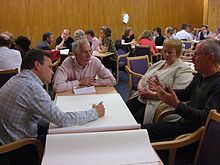World café (conversation): Difference between revisions
m →top: c/e |
→External links: Removal of broken link |
||
| Line 25: | Line 25: | ||
* [http://www.theworldcafe.com The World Café] |
* [http://www.theworldcafe.com The World Café] |
||
* [http://www.theworldcafecommunity.org The World Café community] |
* [http://www.theworldcafecommunity.org The World Café community] |
||
* [http://www.freewebs.com/worldcafeuk World Café UK] |
|||
{{DEFAULTSORT:World Cafe}} |
{{DEFAULTSORT:World Cafe}} |
||
Revision as of 00:41, 25 October 2017

A World Café or Knowledge Café is a structured conversational process for knowledge sharing in which groups of people discuss a topic at several tables, with individuals switching tables periodically and getting introduced to the previous discussion at their new table by a "table host". A café ambience is created in order to facilitate conversation. In some versions, a degree of formality is retained to make sure that everyone gets a chance to speak.[1] Alternatively, the café concept can be taken more literally with everyone potentially talking at once. As well as speaking and listening, individuals may be encouraged to write or doodle on the tablecloth so that when people change tables, they can see what previous members have written as well as hearing the table host's view of what has been happening. Although pre-defined questions are agreed at the beginning, outcomes or solutions are not decided in advance.[2][3] An underlying assumption of World Café events is that collective discussion can shift people's conceptions and encourage collective action.[4]
The World Café originated at the home of Juanita Brown and David Isaacs in 1995 when a "large circle" conversation became disrupted by rain.[5]
In the version used by David Gurteen (who uses the term "Knowledge Café"), the small group discussions are not led by a facilitator, and no summary is captured for subsequent feedback to the group - the aim is to maximise time spent in conversation and so time spent with one person presenting is minimised.[6]
World Café events tend to have at least twelve participants, but there is theoretically no upper limit.[7] In Israel in 2011 an event called "1,000 tables" was hosted in several cities on a single day as part of a series of social justice protests held around that time, and around a thousand people participated.[8] Another example of a World Cafe event was one held in Ohio in 2005 with around sixty people, focused around the question "What does ending hunger mean to you?"[9]
References
- ^ Elliott, Janice; Heesterbeek, Sara; Lukensmeyer, Carolyn J.; Slocum, Nikki (2005). Steyaert, Stef; Lisoir, Hervé (eds.). Participatory methods toolkit : a practitioner's manual. [Brussels]: King Baudouin Foundation / Flemish Institute for Science and Technology Assessment. pp. 185ff. ISBN 978-90-5130-506-7.
- ^ Christopher M. Bache (28 August 2008). The Living Classroom: Teaching and Collective Consciousness. SUNY Press. ISBN 978-0-7914-7646-8.
- ^ Merianne Liteman; Sheila Campbell; Jeffrey Liteman (14 July 2006). Retreats That Work: Everything You Need to Know About Planning and Leading Great Offsites. John Wiley & Sons. pp. 48–. ISBN 978-0-7879-8643-8.
- ^ Sarah Lewis (16 March 2011). Positive Psychology at Work: How Positive Leadership and Appreciative Inquiry Create Inspiring Organizations. John Wiley & Sons. ISBN 978-1-119-99621-7.
- ^ The World Café. "History".
- ^ Gurteen, David (2003 to 2008). "How to run a Knowledge Café". Gurteen. Retrieved 15 February 2017.
{{cite web}}: Check date values in:|date=(help) - ^ Graham Dickson; Bill Tholl (13 January 2014). Bringing Leadership to Life in Health: LEADS in a Caring Environment: A New Perspective. Springer Science & Business Media. pp. 146–. ISBN 978-1-4471-4875-3.
- ^ Hartman, Ben (September 10, 2011). "Round table discussions held in cities across Israel". The Jerusalem Post.
- ^ Margaret J. Wheatley; Deborah Frieze (11 April 2011). Walk Out Walk On: A Learning Journey into Communities Daring to Live the Future Now. Berrett-Koehler Publishers. pp. 192–. ISBN 978-1-60509-733-6.
Further reading
- Allee, Verna (2009-11-03). The Future of Knowledge. Routledge. p. 146–148. ISBN 9781136357893.
- Brown, Juanita; Isaacs, David; The World Cafe Community (2005). The World Café. Berrett-Koehler Publishers. p. 96-98. ISBN 9781605092515.
- Gronau, Norbert (2002). "The Knowledge Café–A Knowledge Management System and Its Application to Hospitality and Tourism". Journal of Quality Assurance in Hospitality & Tourism. 3 (3–4): 75-88. doi:10.1300/J162v03n03_05.
- Kazi, Abdul Samad (2004-11-30). Knowledge Management in the Construction Industry: A Socio-Technical Perspective. IGI Global. p. 61. ISBN 9781591403623.
- Pasher, Edna; Ronen, Tuvya (2011). The Complete Guide to Knowledge Management. John Wiley & Sons. p. 112–114. ISBN 9781118001400.
- Ramjugernath, Deresh (2015). ICIE 2015 3rd International Conference on Innovation and Entrepreneurship. Academic Conferences Limited. p. 191–193. ISBN 9781910309919.
- Skyrme, David (2012-06-14). Capitalizing on Knowledge. Routledge. p. 125–. ISBN 9781136422928.
- Yendol-Hoppey, Diane; Dana, Nancy Fichtman (2010). Powerful Professional Development. Corwin Press. p. 83–. ISBN 9781412979757.
